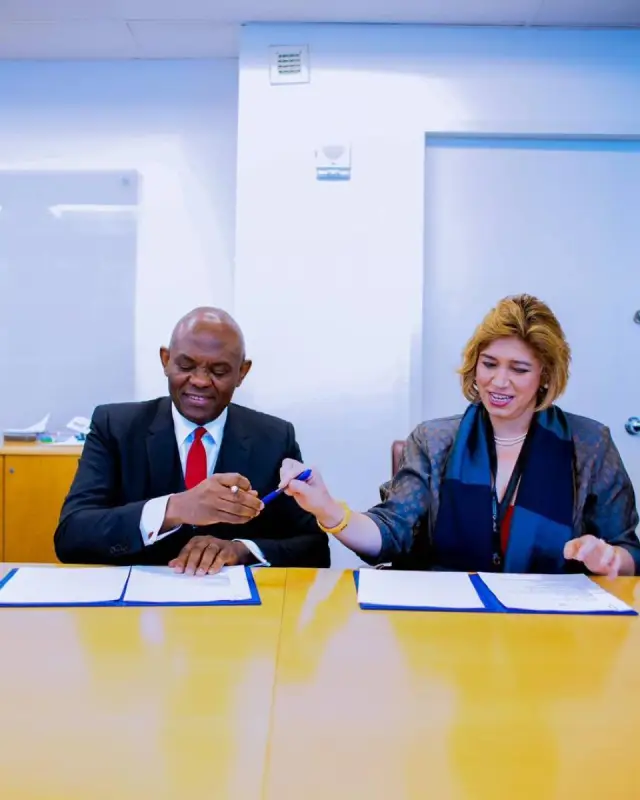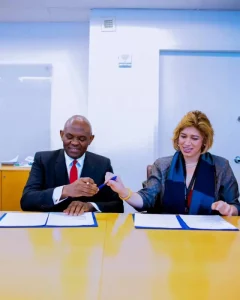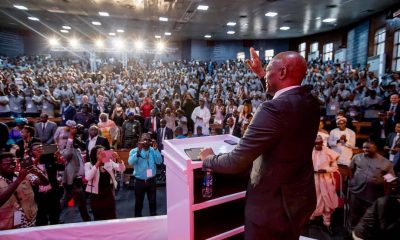Business
Tony Elumelu Foundation Partners With UNCDF To Empower African Youths

Tony Elumelu Foundation Partners With UNCDF To Empower African Youths
Tony Elumelu Foundation (TEF) and the UN Capital Development Fund (UNCDF) has signed an agreement to support youth entrepreneurship in Africa, with a specific focus on historically underinvested areas within African frontier markets.
In bringing together the expertise, experience and boots-on-the-ground presence in African markets of The Tony Elumelu Foundation and UNCDF, the two organizations will work towards reaching and empowering the most promising youth entrepreneurs on the continent.
A memorandum of understanding (MoU) was signed on Tuesday, September 20th, 2020 at the offices of UNCDF on the sidelines of the 77th session of the UN General Assembly.
The agreement was signed by Tony O. Elumelu, C.O.N, Founder of The Tony Elumelu Foundation and Preeti Sinha, Executive Secretary of UNCDF.
Speaking on the partnership, Tony Elumelu, said; “In Africa, we feel the harsh impact of youth joblessness. As African leaders, we must do something. As global leaders, it is important that we work together to address this issue. If we don’t deal with these challenges today, the world will not be a good place for all of us.”
“In Nigeria alone, about 60% of our young ones, who account for half of our population are not employed. This is a problem that we need to resolve collectively. I want to say thank you Preeti, your colleagues, and the entire UNCDF, for supporting this kind of partnership.”
“We know what our young ones in Africa need, we know how having access to finance can help change the trajectory of their lives. I hope that what we are about to do today with this partnership signing will help to expand and scale what we do at TEF.”
“Last year, we partnered with the European Union to empower 3,000 young African women entrepreneurs, because they share our belief that if you empower a woman, you empower an entire community. We hope that this initiative helps us to touch even more lives across the continent.”
However, the Executive Secretary of the UN Capital Development Fund, Preeti Sinha, said; “LDCs face a stark demographic challenge, as their population is projected to double to 1.7 billion by 2050. The LDC youth population aged 15 to 24 years is expected to soar to 300 million by 2050, when one in four youths worldwide will live in an LDC.”
“We cannot embark on this journey alone, as the challenge is daunting and requires a concerted effort. This is why we welcome collaborating with like-minded organisations working in the same direction.”
“The TEF is one like no other, a leading champion of young entrepreneurship in Africa. UNCDF is thrilled about the endless possibilities for collaboration in the field of youth entrepreneurship, leveraging the strengths of both organisations.”
For those who don’t know, the agreement is intended to leverage the distinct capabilities of the two organizations.
The Tony Elumelu Foundation is the leading philanthropy empowering young African entrepreneurs, serving all 54 African countries.
UNCDF serves as the UN’s catalytic finance entity for the world’s 46 least developed countries, which it sees as the frontier economies of today and the growth markets of tomorrow.
As part of the mission to support youth entrepreneurship in Africa, the MoU will call on the two organizations to mobilize resources for youth-led enterprises, including enterprises operating through joint-programmes between The Tony Elumelu Foundation and UNCDF.
The two organizations under the MoU will also look to create platforms that will connect such enterprises with critical resources to support their business models; including financial capital, access to networks and markets and technical assistance.
It is noteworthy that the Tony Elumelu Foundation is the leading champion of entrepreneurship in Africa which objective is to empower women and men across our continent, catalysing economic growth, driving poverty eradication and ensuring job creation.
The Foundation believes the private sector’s role is critical for Africa’s development and that the private sector must create both social and economic wealth.
Founded by African investor and philanthropist, Tony O. Elumelu, C.O.N, and representing his personal commitment to creating a new generation of entrepreneurs, through his investment company, Heirs Holdings, the Foundation is active in all 54 African countries.
UNCDF offers “last mile” finance models that unlock public and private resources, especially at the domestic level, to reduce poverty and support local economic development. UNCDF’s financing models work through three channels: (1) inclusive digital economies, which connects individuals, households, and small businesses with financial eco-systems that catalyze participation in the local economy, and provide tools to climb out of poverty and manage financial lives; (2) local development finance, which capacitates localities through fiscal decentralization, innovative municipal finance, and structured project finance to drive local economic expansion and sustainable development; and (3) investment finance, which provides catalytic financial structuring, de-risking, and capital deployment to drive SDG impact and domestic resource mobilization.
Business
Nigeria’s Inflation Drops to 15.10% as NBS Reports Deflationary Trend

Nigeria’s headline inflation rate declined to 15.10 per cent in January 2026, marking a significant drop from 27.61 per cent recorded in January 2025, according to the latest Consumer Price Index (CPI) report released by the National Bureau of Statistics.
The report also showed that month-on-month inflation recorded a deflationary trend of –2.88 per cent, representing a 3.42 percentage-point decrease compared to December 2025. Analysts say the development signals easing price pressures across key sectors of the economy.
Food inflation stood at 8.89 per cent year-on-year, down from 29.63 per cent in January 2025. On a month-on-month basis, food prices declined by 6.02 per cent, reflecting lower costs in several staple commodities.
The data suggests a sustained downward trajectory in inflation over the past 12 months, pointing to improving macroeconomic stability.
The administration of President Bola Ahmed Tinubu has consistently attributed recent economic adjustments to ongoing fiscal and monetary reforms aimed at stabilising prices, boosting agricultural output, and strengthening domestic supply chains.
Economic analysts note that while the latest figures indicate progress, sustaining the downward trend will depend on continued policy discipline, exchange rate stability, and improvements in food production and distribution.
The January report provides one of the clearest indications yet that inflationary pressures, which surged in early 2025, may be moderating.
Bank
Alpha Morgan to Host 19th Economic Review Webinar

Alpha Morgan to Host 19th Economic Review Webinar
In an economy shaped by constant shifts, the edge often belongs to those with the right information.
On Wednesday, February 25, 2026, Alpha Morgan Bank will host the 19th edition of its Economic Review Webinar, a high-level thought leadership session designed to equip businesses, investors, and individuals with timely financial and economic insight.
The session, which will hold live on Zoom at 10:00am WAT and will feature economist Bismarck Rewane, who will examine the key signals influencing Nigeria’s economic direction in 2026, including policy trends, market movements, and global developments shaping the local landscape.
With a consistent track record of delivering clarity in uncertain times, the Alpha Morgan Economic Review continues to provide practical context for decision-making in a dynamic environment.
Registration for the 19th Alpha Morgan Economic Review is free and can be completed via https://bit.ly/registeramerseries19
It is a bi-monthly platform that is open to the public and is held virtually.
Visit www.alphamorganbank to know more.
Business
GTBank Launches Quick Airtime Loan at 2.95%

GTBank Launches Quick Airtime Loan at 2.95%
Guaranty Trust Bank Ltd (GTBank), the flagship banking franchise of GTCO Plc, Africa’s leading financial services group, today announced the launch of Quick Airtime Loan, an innovative digital solution that gives customers instant access to airtime when they run out of call credit and have limited funds in their bank accounts, ensuring customers can stay connected when it matters most.
In today’s always-on world, running out of airtime is more than a minor inconvenience. It can mean missed opportunities, disrupted plans, and lost connections, often at the very moment when funds are tight, and options are limited. Quick Airtime Loan was created to solve this problem, offering customers instant access to airtime on credit, directly from their bank. With Quick Airtime Loan, eligible GTBank customers can access from ₦100 and up to ₦10,000 by dialing *737*90#. Available across all major mobile networks in Nigeria, the service will soon expand to include data loans, further strengthening its proposition as a reliable on-demand platform.
For years, the airtime credit market has been dominated by Telcos, where charges for this service are at 15%. GTBank is now changing the narrative by offering a customer-centric, bank-led digital alternative priced at 2.95%. Built on transparency, convenience and affordability, Quick Airtime Loan has the potential to broaden access to airtime, deliver meaningful cost savings for millions of Nigerians, and redefine how financial services show up in everyday life, not just in banking moments.
Commenting on the product launch, Miriam Olusanya, Managing Director of Guaranty Trust Bank Ltd, said: “Quick Airtime Loan reflects GTBank’s continued focus on delivering digital solutions that are relevant, accessible, and built around real customer needs. The solution underscores the power of a connected financial ecosystem, combining GTBank’s digital reach and lending expertise with the capabilities of HabariPay to deliver a smooth, end-to-end experience. By leveraging unique strengths across the Group, we are able to accelerate innovation, strengthen execution, and deliver a more integrated customer experience across all our service channels.”
Importantly, Quick Airtime Loan highlights GTCO’s evolution as a fully diversified financial services group. Leveraging HabariPay’s Squad, the solution reinforces the Group’s ecosystem proposition by bringing together banking, payment technology, and digital channels to deliver intuitive, one-stop experiences for customers.
With this new product launch, Guaranty Trust Bank is extending its legacy of pioneering digital-first solutions that have redefined customer access to financial services across the industry, building on the proven strength of its widely adopted QuickCredit offering and the convenience of the Bank’s iconic *737# USSD Banking platform.
About Guaranty Trust Bank
Guaranty Trust Bank (GTBank) is the flagship banking franchise of GTCO Plc, a leading financial services group with a strong presence across Africa and the United Kingdom. The Bank is widely recognized for its leadership in digital banking, customer experience, and innovative financial solutions that deliver value to individuals, businesses, and communities.
About HabariPay
HabariPay is the payments fintech subsidiary of GTCO Plc, focused on enabling fast, secure, and accessible digital payments for individuals and businesses. By integrating payments and digital technology, HabariPay supports innovative services that make everyday financial interactions simpler and more seamless.
Enquiries:
GTCO
Group Corporate Communication
[email protected]
+234-1-2715227
www.gtcoplc.com
-

 celebrity radar - gossips6 months ago
celebrity radar - gossips6 months agoWhy Babangida’s Hilltop Home Became Nigeria’s Political “Mecca”
-

 society6 months ago
society6 months agoPower is a Loan, Not a Possession: The Sacred Duty of Planting People
-

 society5 months ago
society5 months agoReligion: Africa’s Oldest Weapon of Enslavement and the Forgotten Truth
-

 news6 months ago
news6 months agoTHE APPOINTMENT OF WASIU AYINDE BY THE FEDERAL GOVERNMENT AS AN AMBASSADOR SOUNDS EMBARRASSING








